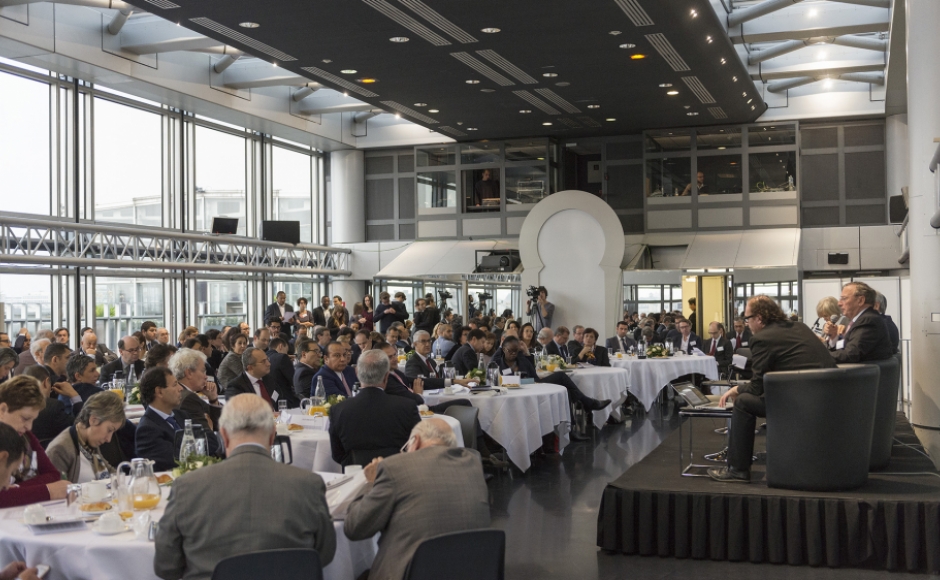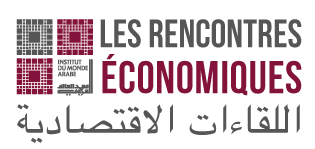The Key Issues of Moroccan Economic Development

Economic Forum Day, 25 November 2014
As part of the event ‘Contemporary Morocco’, the Arab World Institute decided to give extra weight to the quarterly meetings of the Arab world Economic Forum Breakfasts, by holding an entire day of discussions, debates, and exchanges about Morocco.
Six round tables enabled the participants to discuss all the key issues related to economic development, tourism, and philanthropy in Morocco. At the same time, networking spaces and B2B events provided exceptional opportunities for encounters between French and Moroccan economic actors.
The Arab World Institute would like to warmly thank the partners of this Economic Forum Day: the Moroccan Embassy in France, the French Chamber of Commerce and Industry for Morocco, the Moroccan Investment Development Agency, Morocco Export, the Moroccan National Tourist Office, and the Maison de l’Artisan in Morocco.
The opening speeches were made by Jack Lang, President of the Arab World Institute, and HE Mr Chakib Benmoussa, Ambassador of His Majesty the King of Morocco to France
Economic and commercial relations between France and Morocco
Although France is Morocco’s primary commercial partner, French investments in Morocco must now adjust to the opening of the Kingdom’s economy and hence international competition. With a growth of 3% this year and forecasted growth of 4.4% next year, the efforts undertaken in Morocco to promote the emergence of industrial ecosystems has borne fruit in strong sectors such as the Aeronautical and Automobile industries, a success story that may serve as a model for the entire Moroccan economy. What are the new levers for economic relations between the two countries? How will the partnership between France and Morocco develop over the coming years?
Participants:
- Elisabeth Guigou, President of the Committee for Foreign Affairs in the Assemblée Nationale
- Mohamed El Kettani, Co-Chairman of the France-Morocco Businessmen Club and CEO and Managing Director of the Attijariwafa Bank
- Khalid Dahami, Member of the Board of Directors of the General Confederation of Moroccan Companies and President of the Federation of Commerce and Services
- Jean-Marie Grosbois, President of the French Chamber of Commerce and Industry for Morocco
- Jacques Prost, Managing Director of the Renault Group in Morocco
Chaired by: Franck Mathiau, Editorial Manager of Conjoncture, the review published by the French Chamber of Commerce and Industry for Morocco
Morocco as a hub for Africa
Economically dependent on a Europe undergoing financial crises, Morocco has increased its economic presence in southern Sahara. This objective has been promoted at the highest level, as illustrated by the royal tour in four African countries, which has already borne fruit: in terms of funding, the country’s main banks are now firmly established in the CFA franc zone; in investment terms, several major groups have begun to deploy on the ground and Morocco is now the primary investor in the Central African Economic and Monetary Community (CEMAC) and the West African Economic and Monetary Union (WAEMU) zone; and, in terms of trade, whose volume has practically doubled in just four years.
As a result of these strengthened links and due to its geographic location, logistical infrastructures, local competencies, and the ongoing development of a modern financial centre, the North African country now intends to become the main hub between two of its most important partners: sub-Saharan Africa and Europe.
Participants:
- Driss Benhima, President and Managing Director of Royal Air Maroc
- Xavier Beulin, President of Sofiprotéol
- Yacine Fal, Resident Representative of the Morocco Field Office (African Development Bank)
- Leïla Aoujdad, Business Development Manager for the Moroccan Investment Development Agency in France
Chaired by: Frédéric Maury, Editor-in-Chief (economy) of Jeune Afrique
Morocco: leading sustainable development in Africa
Certain subjects have been on the agenda in Morocco for a number of years: the environment, the preservation of resources, fragile ecological systems, the protection of species, and so on. This is to be expected in a country whose water resources are limited: people quickly learn to turn off taps and the population has now adopted this parsimonious approach.
However, it is quite another challenge to construct a global and coherent approach. It takes time, and often some impetus from the royal family, because this has always motivated the Moroccans to implement their initiatives.
Like anywhere else, the concept of ‘sustainable development’ has been implemented via a National Strategy for Sustainable Development (NSSD), which is based on nine axes: ‘Green Morocco’, water, renewable energies, the Halieutis Plan (the application of the ‘Biological Rest Programme’) for fisheries management, ‘Visions’ for tourism, the components of sustainable industrial systems, the sectors of professional and higher-education training, the role of the municipalities, construction and housing, and, lastly, the National Human Development Initiative (NHDI), a form of ‘social ecology’.
Participants:
- Aziz Akhannouch, Minister of Agriculture and Maritime Fishing of the Kingdom of Morocco
- Stéphane Le Foll, Minister of Agriculture, Agrifood, and Forestry, and spokesperson of the French government
- Abdellaziz Abarro, President and Managing Director of the Managem Group
- Marie-Ange Debon, Deputy Managing Director in charge of Suez Environnement’s International Division
Chaired by: Nadia Salah, Administrator and Editorial Director for the Eco-Médias Group
Morocco: the new financial centre
The Moroccan economy is experiencing a low savings rate, which results in recurrent current account deficits (10% of the GDP in 2012). In this context, the banks and the financial system are facing the major challenge of re-equilibrating the situation by ensuring short-term funding for a loss-making economy and improving long-term savings collection.
But the activity of the Moroccan financial system also extends beyond the borders of the country. Moroccan banks are operating abroad, in both Europe and Africa. At the same time, multinational companies have designated Morocco as the regional financial platform for their operations.
This is attested by Casablanca—Africa’s second financial centre in terms of competitiveness for the Global Financial Centres Index—, which, with the creation of Casablanca Finance City, brings together financial firms, asset management companies, and the regional or international headquarters of companies that run their service activities abroad.
Participants:
- Saïd Ibrahimi, President and Managing Director of Casablanca Finance City Authority
- El Hadi Chaïbaïnou, Managing Director of the Professional Group of Banks in Morocco
- Brahim Benjelloun-Touimi, Administrator and Managing Director of the BMCE Bank Group
- Laurent Dupuch, President of the BMCI Directory
- Jamal Lemridi, Managing Director and member of the Directory of Crédit du Maroc
Chaired by: Jean-Marc Daniel, Economist and Associate Professor at ESCP Europe
Tourism in Morocco: trends and prospects
Many complementary issues were discussed at the round table devoted to tourism: firstly, the subject of why French tourists were more wary than other Europeans when choosing Morocco as a holiday destination; then, an overview was given of the seaside resorts in Morocco and tourist ‘niches’ that have promising prospects; and lastly, the Moroccan and French professionals discussed how to boost a market that is as old as the French tourism market.
Participants:
- Hatim El Gharbi, Director of the Moroccan National Tourist Office in Paris
- Jean-François Rial, President and Managing Director of Voyageurs du Monde
- Ali Ghannam, President of the National Tourist Confederation
- René-Marc Chikli, President of the Syndicat des Entreprises du Tour Operating
Chaired by: Pierre Amalou, President of Strategos
Morocco’s philanthropic actors
Thanks to the experiences of Morocco’s major philanthropic actors, this round table addressed the main issues of a trend that is increasingly emerging as a significant asset for the development of the country. What are the levers for this tendency? What are its weaknesses? What is its economic, social, and cultural role? How does it stand in relation to similar schemes that exist in the United States, in certain European countries, and in other parts of the world? These questions were addressed via concrete examples of initiatives implemented by our participants.
Participants:
- Karima Benabderrazik, Director of Communication at BMCI and Secretary General of the BMCI Foundation
- Alexandra Balafrej, Managing Director of the Alliances Foundation
- Hinde Taarji, Director of International Relations at the Banque Populaire Foundation in Morocco
- Samia Ahmidouch, Managing Director of the Société Générale Foundation in Morocco
Chaired by: Augustin Debiesse, Associate Founder of Equanity
Inscription à la newsletter
Pour recevoir toute l'actualité de l'Institut du monde arabe sur les sujets qui vous intéressent
Je m'inscris



























